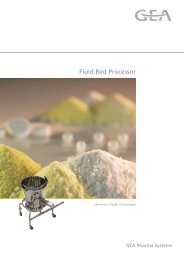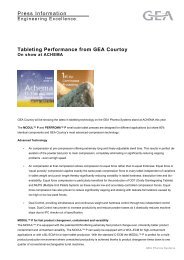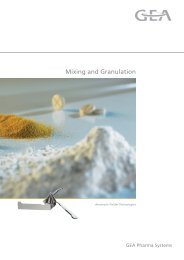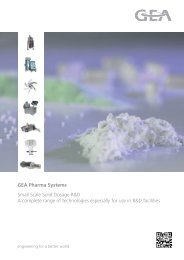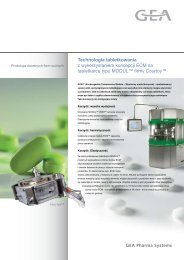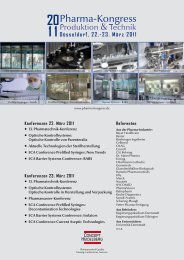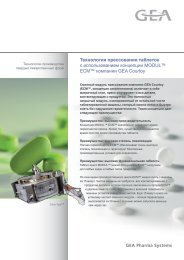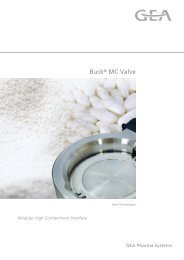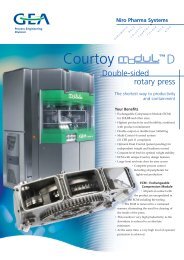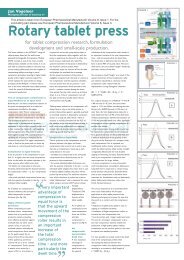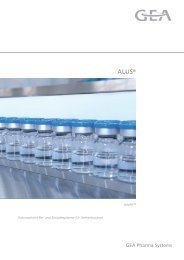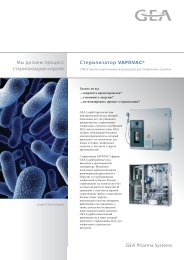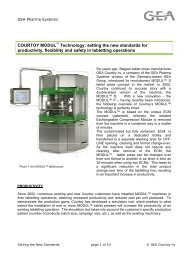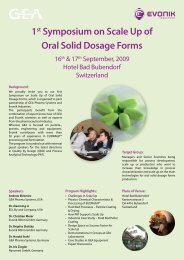Spray Drying 2010 - GEA Pharma Systems
Spray Drying 2010 - GEA Pharma Systems
Spray Drying 2010 - GEA Pharma Systems
You also want an ePaper? Increase the reach of your titles
YUMPU automatically turns print PDFs into web optimized ePapers that Google loves.
EUROPEAN CONFERENCE<br />
<strong>Spray</strong> <strong>Drying</strong> <strong>2010</strong><br />
• Full-day hands-on<br />
<strong>Spray</strong> <strong>Drying</strong> Course<br />
Solutions for the <strong>Pharma</strong>ceutical Industry<br />
Image: <strong>GEA</strong> <strong>Pharma</strong> <strong>Systems</strong><br />
20 – 22 April <strong>2010</strong>, Copenhagen, Denmark<br />
SPEAKERS:<br />
Dr Sune Klint Andersen<br />
Novo Nordisk A/S, Denmark<br />
Dr Filipe Gaspar<br />
Hovione, Portugal<br />
Dr Marco Gil<br />
Hovione, Portugal<br />
Prof Geoffrey Lee<br />
Erlangen University, Germany<br />
Dr Michelle Madsen<br />
Novozymes A/S, Denmark<br />
Henrik Schwartzbach<br />
<strong>GEA</strong> Process Engineering A/S, Denmark<br />
Dr Harald Stahl<br />
<strong>GEA</strong> <strong>Pharma</strong> <strong>Systems</strong>, Germany<br />
Dr Jody Voorspoels<br />
SEPS <strong>Pharma</strong>, Belgium<br />
Prof Peter Walzel<br />
Technical University Dortmund, Germany<br />
PROGRAMME:<br />
• Fundamentals of <strong>Spray</strong> <strong>Drying</strong><br />
• Development of <strong>Spray</strong> <strong>Drying</strong> processes<br />
• Influence of the nozzle design on product<br />
parameters<br />
• Quality-by-Design for <strong>Spray</strong> <strong>Drying</strong><br />
processes<br />
• Scale up of a pharmaceutical <strong>Spray</strong><br />
<strong>Drying</strong> processes<br />
• Validation of <strong>Spray</strong> <strong>Drying</strong> processes in<br />
an cGMP environment<br />
• Risk-based approach to <strong>Spray</strong> <strong>Drying</strong><br />
• Stable amorphous solid dispersions for<br />
enhanced bioavailability<br />
• <strong>Spray</strong>-dried powders for direct tablet<br />
compression
<strong>Spray</strong> <strong>Drying</strong> – Solutions for the <strong>Pharma</strong>ceutical Industry<br />
20-21 April <strong>2010</strong>, Copenhagen, Denmark<br />
Objectives<br />
Take advantage of the opportunity to focus on spray drying<br />
technology and process and get a first hand demonstration<br />
of solutions for diverse requirements. Further,<br />
benefit from the post-conference course where you can<br />
get a hands-on experience in spray drying yourself. You<br />
will learn in small groups how the spray drying result is<br />
affected by different equipment, parameter changes, solvents<br />
etc.<br />
Background<br />
<strong>Spray</strong> drying is presently one of the most exciting technologies<br />
for the pharmaceutical industry, being an ideal<br />
process where the end-product must comply with precise<br />
quality standards regarding particle size distribution, residual<br />
moisture/solvent content, bulk density and morphology.<br />
One advantage of spray drying is the remarkable versatility<br />
of the technology, evident when analyzing the multiple<br />
applications and the wide range of products that can be<br />
obtained. From very fine particles for pulmonary delivery<br />
to big agglomerated powders for oral dosages, from amorphous<br />
to crystalline products and the potential for onestep<br />
formulations, spray drying offers multiple opportunities<br />
that no other single drying technology can claim.<br />
Benefits of <strong>Spray</strong> <strong>Drying</strong><br />
• High precision control over:<br />
– Particle size<br />
– Bulk density<br />
– Degree of crystallinity<br />
– OVIs and residual solvents<br />
• Typical application in pre-formulated products<br />
– Microencapsulations<br />
– Solid solutions<br />
– Improved bioavailability and stability<br />
For products with unusual or difficult characteristics<br />
•<br />
– Sticky or hygroscopic products<br />
– Slowly crystallizing products<br />
– Difficult to isolate products<br />
Rapid drying for temperature sensitive materials<br />
•<br />
Target Group<br />
This conference addresses specialists and executives<br />
working in the fields of pharmaceutical manufacture, research<br />
and development, quality control and assurance<br />
as well as technicians, planners and plant designers, especially<br />
those involved with the manufacture of powders<br />
and granules, as e.g. in the manufacture of solid dosage<br />
forms for oral or pulmonary administration.<br />
Moderator<br />
Dr Harald Stahl<br />
Programme<br />
Fundamentals of <strong>Spray</strong> <strong>Drying</strong><br />
• Identification of Critical Process Parameters<br />
• Control of those Process Parameters<br />
• Influence of these Process Parameters on Product<br />
Quality<br />
• Example of setting up a <strong>Spray</strong> <strong>Drying</strong> Process<br />
Development of a <strong>Spray</strong> <strong>Drying</strong> Process<br />
Practical Aspects on how to develop a spray drying<br />
process<br />
•<br />
•<br />
•<br />
•<br />
•<br />
•<br />
Process limitations<br />
Equipment limitations<br />
Feed material characteristics<br />
Desired product and process characteristics<br />
<strong>Spray</strong> drying process evaluating<br />
Process and equipment optimisation/scale-up<br />
<strong>Spray</strong> <strong>Drying</strong> under Quality by Design<br />
• Advantages of QbD<br />
• How and when we conduct Risk-Assessments<br />
• How we develop a Design Space<br />
• How we define the Normal Operating Range<br />
• How we implement a Control Strategy<br />
A risk-based approach is effective in identifying the<br />
processes areas and control loops that are most likely to<br />
result in product quality deviations. By applying PAT the<br />
processes and control loops can be monitored for better<br />
process understanding and improved process control,<br />
ultimately leading to a better product consistency.<br />
<strong>Spray</strong> <strong>Drying</strong> on Laboratory Scale<br />
• Lab-sale & micro-scale spray dryers<br />
• Design & process conditions<br />
• Enthalpy calculations<br />
• Advantages & limitations;<br />
• Examples<br />
Influence of <strong>Spray</strong> Parameters and Nozzle Design on<br />
Product Quality<br />
The drying performance of individual slurry droplets depends<br />
on the uniformity of the spray particle diameter d as<br />
the drying time is proportional to d2. The particle structure<br />
formed during solidification as a major quality parameter is<br />
linked to the drying time. This statement includes the droplet<br />
size as well as the trajectories of the particles, which may<br />
lead to very different drying histories of individual drops.<br />
Fairly uniform drop size distributions and spray propagation<br />
is obtained from swirl nozzles at moderate pressures within<br />
a limited flow rate range. Fine particles can be obtained with<br />
pneumatic atomizers even so the drop size distribution is<br />
fairly broad. Rotary atomizers usually also lead to broad<br />
spectra even so recent developments may provide a method<br />
to obtain very narrow PSD and very uniform products.
Scale-up of <strong>Spray</strong> <strong>Drying</strong> Processes<br />
<strong>Spray</strong> drying has become a widespread technology applied<br />
within the pharmaceutical development. The bench scale<br />
units can be found in most of material characterisation and<br />
drug development teams, being also used as production<br />
units of high-value low-volume drugs. However, it is often<br />
underestimated the valuable information that lab experiments<br />
can give to help in a successful process scale-up. In<br />
this presentation a scale-up methodology will be presented<br />
where insight will be given on what and how lab scale data<br />
can be used, as well as, how scaling-up can be used to improve<br />
product properties.<br />
•<br />
•<br />
•<br />
Usage of lab scale data<br />
Product improvement during scale up<br />
Methodology for scale-up of SD processes<br />
Validation of <strong>Spray</strong> <strong>Drying</strong> Processes in Production<br />
Scale<br />
• Establishing User Requirement Specifications and<br />
Validation Master Plan<br />
• Risk assessment in the context of qualification and<br />
validation<br />
• Carrying out Installation Qualification and Operational<br />
Qualification<br />
• Performance Qualification and Process Validation<br />
• The Effect of Quality-by-Design on Validation<br />
<strong>Spray</strong>-dried <strong>Pharma</strong>ceutical Powders for Direct Tablet<br />
Compression<br />
• Introduction to spray-dried direct compressible<br />
powders<br />
• FSD spray agglomeration<br />
• Tall form dryers for large mono particles<br />
• Case story 1 (CS1): <strong>Spray</strong> dried Paracetamol powders<br />
from a Mobile Minor laboratory spray dryer<br />
• Case story 2 (CS2): 16 x Up-scaling from CS1 to a semiproduction<br />
scale spray dryer (SD-12-N)<br />
Enhanced Bioavailability of Amorphous <strong>Spray</strong>-dried<br />
Dispersions<br />
• Poorly soluble drugs<br />
• Amorphous solid dispersions<br />
• Enhanced bioavailability by spray drying<br />
• Case studies<br />
Hand-On <strong>Spray</strong> <strong>Drying</strong> Course<br />
Thursday, 22 April <strong>2010</strong><br />
On the third conference day you will have the opportunity<br />
to take advantage of an exclusive hands-on<br />
training. For that purpose four different spray dryers<br />
will be disposed at the Niro Test Station. Experienced<br />
Trainers will lead you in very small groups, providing an<br />
intensive experience and directly applicable knowhow.<br />
You will see how different spray drying equipment,<br />
different solvents, products, and variation of process<br />
parameters affect the yield, drying progress and particle<br />
size. You will learn how to design feasibility studies,<br />
how to optimise production parameters and how<br />
to proceed a scale-up from laboratory to industrial<br />
scale. Furthermore, you will learn how to analyse and<br />
evaluate your product and the process by using methods<br />
like Laser Diffraction, Microscopy and LoD.<br />
Target group of the Course:<br />
<strong>Pharma</strong>ceutical Technologists, <strong>Pharma</strong>ceutical Formulation<br />
Scientists, Application Chemists, Drug Development<br />
Engineers, Particle Design Engineers.<br />
Experiments<br />
• Labscale spray drying of aqueous/organic solvent<br />
applications under contained conditions and influence<br />
of process parameters on drying conditions<br />
• Upscale to pilot-scale spray drying of organic solvent<br />
applications and influence of process parameters<br />
on particle size<br />
• Labscale spray drying of aqueous application and influence<br />
of process parameters on drying conditions<br />
• Labscale spray drying of organic solvent application<br />
and influence of process parameters on particle size<br />
Photo: Niro<br />
A shuttle bus will bring you back to the hotel with a<br />
prior stop at the airport. Airport arrival is scheduled<br />
for approximately 16.30 h.<br />
The course is held in very small groups, so number of<br />
participants is strongly limited. Early booking is recommended.
Speakers<br />
Dr Sune Klint Andersen, Novo Nordisk A/S, Denmark<br />
Dr Andersen studied at the Technical University of Denmark<br />
and gained his Ph.D. in Particle Technology. From<br />
1999-2007 he worked for Niro A/S as <strong>Spray</strong> <strong>Drying</strong> specialist<br />
and is now working for Novo Nordisk A/S also in<br />
the position of a <strong>Spray</strong> <strong>Drying</strong> Specialist.<br />
Dr Filipe Gaspar, Hovione, Portugal<br />
Filipe Gaspar gained profound knowledge in the use of<br />
supercritical fluids technologies in both pharmaceutical<br />
and nutraceutical industries. In 2003, Dr. Gaspar joined<br />
Hovione, first as Production Engineer and later in R&D as<br />
a Senior Engineer. He is now the Director of the Discipline<br />
of Particle Design and the focus of his work is in the<br />
application of particle engineering technologies, such as<br />
spray drying, to active ingredients and pre-formulated<br />
products.<br />
Prof Dr Geoffrey Lee, Erlangen University, Germany<br />
Geoff Lee studied pharmacy in London and also completed<br />
his PhD in colloid science there. After 2 years‘ stay<br />
as an Assistant Professor at the University of Illinois, Chicago,<br />
he was appointed Associate Professor in <strong>Pharma</strong>ceutics<br />
at the University of Heidelberg. In 1993 he was<br />
given the Chair in <strong>Pharma</strong>ceutics at Erlangen University.<br />
Prof Lee‘s major research interests are the drying of proteins,<br />
and the transdermal delivery of drugs.<br />
Dr Marco Gil, Hovione, Portugal<br />
Marco Gil studied Chemical Engineering at Technical<br />
University of Lisbon, from where he obtained also his<br />
PhD. In 2007 he joined Hovione’s Particle Design group<br />
where he is focused on the application of particle engineering<br />
technologies, such as spray drying, in the development<br />
of pharmaceutical products with enhanced<br />
properties, wherein amorphous solid dispersions have<br />
special relevance.<br />
Senior Process Technologist he is deeply involved in setting<br />
the industry standards for pharmaceutical spray drying.<br />
Dr Harald Stahl, <strong>GEA</strong> <strong>Pharma</strong> <strong>Systems</strong>, Germany<br />
Dr Harald Stahl worked for 3 years in the <strong>Pharma</strong>ceutical<br />
Development of Schering AG in Germany. At that time<br />
his main interest was the aseptic production of pellets.<br />
Since 1995 he served within <strong>GEA</strong> Process Technology in<br />
various positions. Presently he owns the position of a<br />
Senior <strong>Pharma</strong>ceutical Technologist of <strong>GEA</strong> <strong>Pharma</strong> <strong>Systems</strong>.<br />
He has published more than 20 papers on various<br />
aspects of pharmaceutical production.<br />
Dr Jody Voorspoels, SEPS <strong>Pharma</strong>, Belgium<br />
Jody is a pharmacist and holds a Ph.D. in pharmaceutical<br />
technology from Ghent University. In 2000 he joined Tibotec,<br />
where he was responsible for early formulation of<br />
a number of new HIV compounds. In 2002 he joined<br />
Janssen <strong>Pharma</strong>ceutica and was responsible for the development<br />
of solid dosage forms. In 2009 he joined SEPS<br />
<strong>Pharma</strong> as Chief Scientific Officer. He has developed<br />
drug delivery systems from immediate release to controlled<br />
release, for water soluble to poorly soluble drugs, liquid<br />
to solid dosage forms.<br />
Prof Dr Peter Walzel, Technical University of Dortmund,<br />
Germany<br />
Prof Walzel studied chemical engineering and completed<br />
his PhD in Graz. He habilitated in Essen were he also<br />
started his work as Professor in 1990. Since 1999 he is<br />
professor for mechanical chemical engineering at the<br />
technical university in Dortmund. Besides he his university<br />
career he also worked for Bayer AG for 13 years.<br />
Dr Michelle Madsen, Novozymes A/S, Denmark<br />
Michelle studied Mechanical Engineerung and holds a<br />
master in Industrial Drug Development. She worked for<br />
Niro in engineering projects and latter as process development<br />
scientist for the spray dryer lin and formulation<br />
consultant for the <strong>Pharma</strong> Division of Nir. Since 2009 she<br />
workes for Novozymes in the sold products development,<br />
responsible for the process characterization of<br />
several biopharmaceutical molecules.<br />
Henrik Schwartzbach, <strong>GEA</strong> Process Engineering A/S,<br />
Denmark<br />
Henrik Schwartzbach has been working for <strong>GEA</strong> Niro<br />
since 1992 with research & development and process<br />
optimisation. The focus for the last 12 years has been research<br />
& development and process optimisation within<br />
pharmaceutical spray drying. Henrik Schwartzbach has<br />
detailed and in-depth knowledge about cutting edge<br />
pharmaceutical spray drying. As the <strong>GEA</strong> Niro <strong>Pharma</strong><br />
Social Event<br />
On Tuesday, 20 April you are cordially invited to a social<br />
event. This is an excellent opportunity to share your experiences<br />
with colleagues from other companies in a relaxed<br />
atmosphere.
Date<br />
Tuesday, 20 April <strong>2010</strong>, 13.00 – 18.00 h<br />
(Registration and coffee 12.30 – 13.00 h h)<br />
Wednesday, 21 April <strong>2010</strong>, 08.30 to approx 17.00 h<br />
Thursday, 22 April <strong>2010</strong>, 8.30 -16.30 1 /17.00 2 h<br />
Tuesday, 20 April<br />
Wednesday, 21 April<br />
Conference<br />
Conference<br />
Thursday, 22 April Workshops: Hands-on Training 1,2<br />
1<br />
Approximate Airport Arrival<br />
2<br />
Approximate Hotel Arrival<br />
Venue<br />
Radisson SAS Scandinavia Hotel<br />
Amager Boulevard 70<br />
2300 Copenhagen S<br />
Denmark<br />
Tel +45 339 650 00<br />
Fax +45 381 565 01<br />
Fees<br />
Fees Conference<br />
Non-ECA Members EUR 1,490.- per delegate plus VAT<br />
ECA Members EUR 1,341.- per delegate plus VAT<br />
APIC Members EUR 1,415.- per delegate plus VAT<br />
(does not include ECA Membership)<br />
EU GMP Inspectorates EUR 745.- per delegate plus VAT<br />
The conference fee is payable in advance after receipt of<br />
invoice and includes conference documentation, dinner on the<br />
first day, lunch on the second day and all refreshments. VAT is<br />
reclaimable.<br />
Fees Conference and Workshop<br />
Non-ECA Members EUR 1,990.- per delegate plus VAT<br />
ECA Members EUR 1,790.- per delegate plus VAT<br />
APIC Members EUR 1,890.- per delegate plus VAT<br />
(does not include ECA Membership)<br />
EU GMP Inspectorates EUR 995.- per delegate plus VAT<br />
The conference fee is payable in advance after receipt of<br />
invoice and includes conference documentation, dinner<br />
on the first day, lunch on the second day and a lunch snack on<br />
the third day and all refreshments. VAT is reclaimable.<br />
Fees Workshop on 22 April <strong>2010</strong><br />
Non-ECA Members EUR 990.- per delegate plus VAT<br />
ECA Members EUR 890.- per delegate plus VAT<br />
APIC Members EUR 940.- per delegate plus VAT<br />
(does not include ECA Membership)<br />
(Please ask for registration details)<br />
There will be a bus transfer after the hand-on session to the<br />
hotel via the airport.<br />
In certain cases a participation in the workshop may not be<br />
possible due to competitive reasons.<br />
Conference language<br />
The official conference language will be English.<br />
Organisation and Contact<br />
CONCEPT HEIDELBERG<br />
P.O. Box 10 17 64<br />
D-69007 Heidelberg<br />
Germany<br />
Phone +49 (0) 62 21/84 44-0<br />
Fax +49 (0) 62 21/84 44 34<br />
E-mail: info@concept-heidelberg.de<br />
www.concept-heidelberg.de<br />
For questions regarding content:<br />
Dr. Robert Eicher (Operations Director) at<br />
+49-62 21 / 84 44 12, or per e-mail at<br />
eicher@concept-heidelberg.de<br />
For questions regarding reservation, hotel, organisation, etc.:<br />
Jessica Stuermer (Organisation Manager), at<br />
+49-62 21 / 84 44 43, or per e-mail at<br />
stuermer@concept-heidelberg.de<br />
About CONCEPT HEIDELBERG<br />
Founded in 1978, CONCEPT HEIDELBERG is the leading<br />
organiser of seminars on pharmaceutical production, quality<br />
control, quality assurance and GMP in Europe. This year more<br />
than 240 events will be organised by CONCEPT HEIDELBERG.<br />
ECA has entrusted CONCEPT HEIDELBERG with the organisation<br />
of its events.<br />
The Three Most Important Guidelines and Comparison<br />
Matrix in One Booklet<br />
The European Compliance Academy (ECA) has developed a<br />
Good Practice Guide „FDA cGMP, EU / PIC/S GMP and ISO<br />
9001 Matrix for a pharmaceutical Quality System“.<br />
This Roadmap includes the full-text version of the three<br />
Guidelines:<br />
• FDA‘s cGMP Guide (21 CFR 210/211)<br />
• PIC/S GMP Guide incl. Annex 18 / ICH Q7A (identical with<br />
EU GMP Guide)<br />
• ISO 9001 on Quality Management <strong>Systems</strong><br />
The three Guidelines will be supplemented by a GMP/ISO<br />
Matrix that compares the requirements of all three Guidelines.<br />
The booklet contains 20 pages of the GMP Matrix and 390 for<br />
the three Guidelines.<br />
You can purchase the booklet that is printed in an easy-to-use<br />
format at www.gmp-compliance.org. You will be granted the<br />
ECA Members price of 99.- € (plus VAT and shipping costs).<br />
The regular price is 149.- € (plus VAT and shipping costs).<br />
Accommodation<br />
CONCEPT HEIDELBERG has reserved a limited number of<br />
rooms in the conference hotel. You will receive a room<br />
reservation form when you have registered for the event. Please<br />
use this form for your room reservation or be sure to mention<br />
“A200409ECA” to receive the specially negotiated rate for the<br />
duration of your stay. Reservation should be made directly with<br />
the hotel not later than 19 March <strong>2010</strong>. Early reservation is<br />
recommended.<br />
Registration<br />
Via the attached reservation form, by e-mail or by fax message.<br />
Or you register online at www.gmp-compliance.org.
#<br />
What Is ECA<br />
Reservation Form (Please complete in full)<br />
If the bill-to-address deviates from the specifications on the right,<br />
please fill out here:<br />
<strong>Spray</strong> <strong>Drying</strong> – Solutions for the <strong>Pharma</strong>ceutical Industry<br />
Conference on 20-21 April <strong>2010</strong>, Copenhagen, Denmark<br />
Conference and Workshop on 20-22 April <strong>2010</strong>, Copenhagen, Denmark<br />
Workshop on 22 April <strong>2010</strong>, Copenhagen, Denmark<br />
* Mr. * Ms.<br />
Title, first name, surname<br />
Company Department<br />
Important: Please indicate your company’s VAT ID Number P.O. Number, if applicable<br />
Street/P.O. Box<br />
CONCEPT HEIDELBERG<br />
P.O. Box 101764<br />
Fax +49 (0) 62 21/84 44 34<br />
City Zip Code Country<br />
Phone/Fax<br />
D-69007 Heidelberg<br />
GERMANY<br />
E-Mail (please fill in)<br />
In certain cases a participation in the guided tour and the workshop may not be possible due to competitive reasons.<br />
The European Compliance Academy (ECA) is an independent<br />
educational organisation chaired by a Scientific Advisory Board<br />
with members of the pharmaceutical industry and regulatory authorities.<br />
The ECA will provide support to the <strong>Pharma</strong>ceutical Industry and<br />
Regulators to promote the move towards a harmonised set of<br />
GMP and regulatory guidelines by providing information and interpretation<br />
of new or updated guidances.<br />
What Are the Benefits of ECA<br />
First benefit:<br />
During the membership, you enjoy a 10 % discount on the regular<br />
participation fee of any European Conference organised by<br />
ECA in<br />
co-operation with CONCEPT HEIDELBERG.<br />
Second benefit:<br />
The GMP Guideline Manager Software with a<br />
large number of guidelines, e.g. EC Directives,<br />
FDA Guidelines, ICH Guidelines, will be forwarded<br />
to you when you are using your membership<br />
for a conference registration.<br />
How Do You Become a Member of ECA<br />
By participating in one of the European Compliance Conferences<br />
or Courses marked with ECA, you will automatically become a<br />
member of ECA for two years – free of charge. Conferences and<br />
Education Courses organised by ECA will be realised in co-operation<br />
with CONCEPT HEIDELBERG. More information about<br />
ECA can be obtained on the Website http://www.gmp-compliance.org<br />
General Terms of Business<br />
If you cannot attend the conference you have two options:<br />
1. We are happy to welcome a substitute colleague at any time.<br />
2. If you have to cancel entirely, we must charge the following<br />
processing fees:<br />
Cancellation<br />
• until 2 weeks prior to the conference 10 % of the<br />
registration fee.<br />
• until 1 week prior to the conference 50 % of the<br />
registration fee.<br />
• within 1 week prior to the conference 100 % of the<br />
registration fee.<br />
CONCEPT reserves the right to change the materials, instructors,<br />
or speakers without notice or to cancel an event. If the event<br />
must be cancelled, registrants will be notified as soon as possible<br />
and will receive a full refund of fees paid.<br />
CONCEPT will not be responsible for discount airfare penalties<br />
or other costs incurred due to a cancellation.<br />
Terms of payment: Payable without deductions within 10 days<br />
after receipt of invoice.<br />
Important: This is a binding registration and above fees are due<br />
in case of cancellation or non-appearance. If you cannot take<br />
part, you have to inform us in writing. The cancellation fee will<br />
then be calculated according to the point of time at which we<br />
receive your message. In case you do not appear at the event<br />
without having informed us, you will have to pay the full registration<br />
fee even if you have not made the payment yet. You are not<br />
entitled to participate in the conference until we have received<br />
your payment (receipt of payment will not be confirmed)!



